
Light the path and pass the torch
Inspiring, empowering and defining today’s female leaders
August 24, 2022

August 24, 2022

For the young Jones, female heroes like Supergirl were often offshoots of their male counterparts, but Wonder Woman stood alone in her bravery, compassion and commitment to fight for the common good.
Shrugging off pop culture references, Jones, a professor of computer information systems and chair of computer information systems, grows serious when she recalls that it was her mother’s influence, along with the close-knit Asian community in which she was raised, that underscored the fact that female leadership is not based on titles alone. Instead, it is grounded in helping others reach their full potential to find their place in the world. Today, she channels those generational influences into her work as co-director of the People’s United Center for Women & Business and, most recently, with the new Women of Color series.
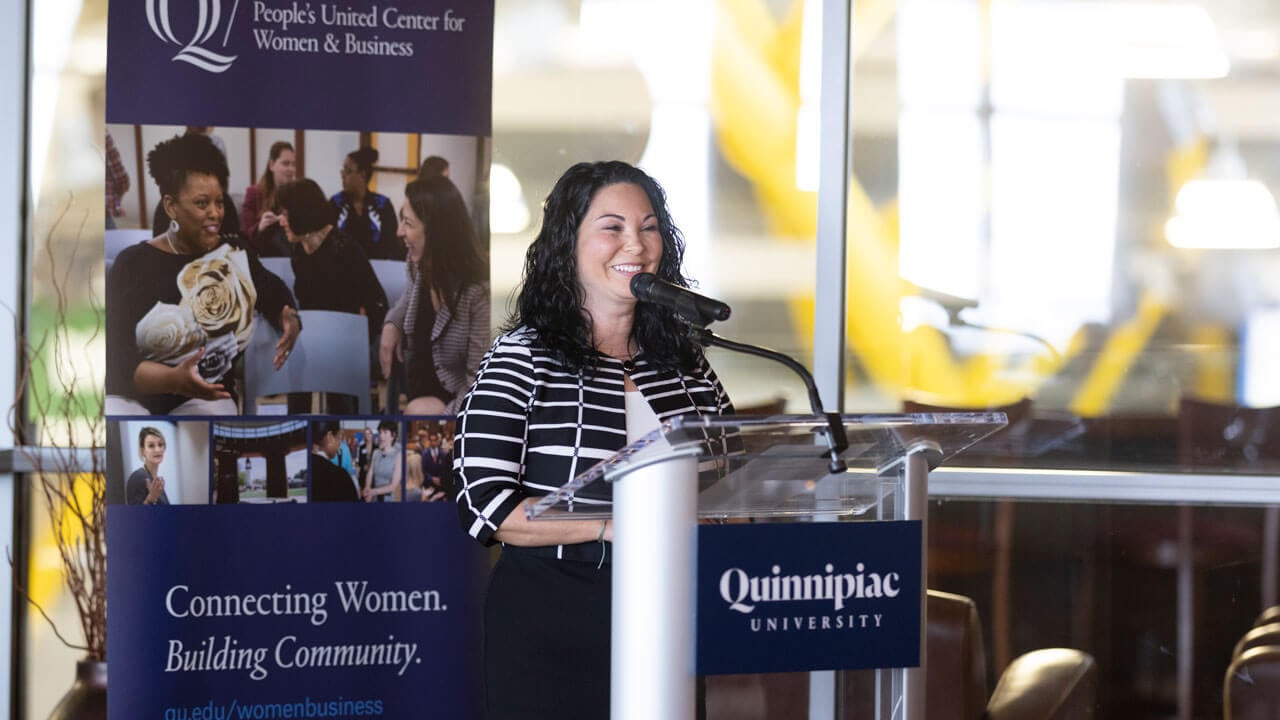
At Quinnipiac University, women leaders don’t just support success; they inspire it. From the example set by the university’s first female president, Judy Olian, to new initiatives such as the Women of Color series and student events with Hamden Mayor Lauren Garrett and Connecticut Lt. Gov. Susan Bysiewicz, QU leaders are challenging stereotypes, encouraging self-empowerment and ensuring a seat at the table for others to lift the mantle of mentorship and sit confidently beside them.
Through the PUCWB, Jones works to bring together women of all stages of work and life to support each other through skill-building workshops, motivational events and networking opportunities.
“Our workshops have helped students learn how to negotiate that first salary and their subsequent salaries. This is a skill that should not be overlooked,” said Jones. “We have given them opportunities to speak on panels and even lead them. Our networking events connect students to high-level individuals they would otherwise never have met. Our presenters and speakers have given students advice and wisdom to take with them as they grow on their journeys. Most of all, though, I hope our students know they are valuable, they are valued, and they are seen.”
In collaboration with multiple offices across campus this spring, Jones, along with PUCWB steering committee member Danisha Collins, was instrumental in developing the three-event Women of Color program that included workshops on salary negotiation and authenticity in the workplace as well as a leadership talk with Dr. Anne Taylor, senior vice president of faculty affairs at Columbia University Irving Medical Center and recipient of the Association of American Medical College’s 2021 Group on Women in Medicine and Science Leadership Award.
“As women of color only in the room, we were able to gain the knowledge and ask the questions that we may not want to ask if others were there,” explained Jones. “I even received follow-up emails and calls for further coaching. This is what I hoped for in this series — continued conversation that goes beyond the end of the workshop.”
Breaking down barriers has also been how Jones has found success in the traditionally male-dominated STEM field of computer information systems. One of her goals is to be authentic in the workplace and help create a pathway without barriers for the next generation to utilize their talents.
“I don’t think there is a ‘formula’ for success. My goal is to break the messages and rules that were put in my way from the beginning by being more authentic,” said Jones. “My goal is to have the younger generation not even begin with those messages. Instead, to start with simply being who they are and creating their own paths to success.”
When it comes to providing the next generation with the tools for success, one Quinnipiac alumna is supporting the initiative literally by putting tools directly into girls’ hands. Her efforts have resulted in the launch of the first local chapter of the national organization, Tools & Tiaras Inc.
Tools & Tiaras was created by one of CNN’s Champions for Change, Judaline Cassidy, a history making plumber for over 25 years. Cassidy had long envisioned starting an organization to show girls that "Jobs Don’t Have Genders.™”
It was a small article in a contractors’ magazine that made a big impact on Erin Joyce-Brady ’12. As the director of marketing and communications for a group of heating, ventilation, air conditioning, electrical and plumbing companies in Massachusetts, Joyce-Brady was surprised to discover only one female plumber out of hundreds of technicians. After reading the article about Tools & Tiara’s New York summer camp for girls, she reached out to the organization to see how she could get involved. The result was the launch of the nonprofit’s first chapter in Boston, led by Joyce-Brady.
“I was so inspired by their mission and wanted the same for girls in our community,” said Joyce-Brady. “I also wanted to help support positive change in my industry. I am beyond excited to lead this inaugural T&T chapter and make a difference in the lives of girls in our area.”
This summer, the Boston Chapter of T&T welcomed girls ages 6-10 to attend a hands-on workshop incorporating hard and soft skills learning, and an overview of the important role trades play in shaping our societies. The inaugural August program was free for registrants and included interactive learning sessions with a 19-year-old plumber, two female firefighters and a virtual lesson with an amateur female boxer from Pennsylvania.
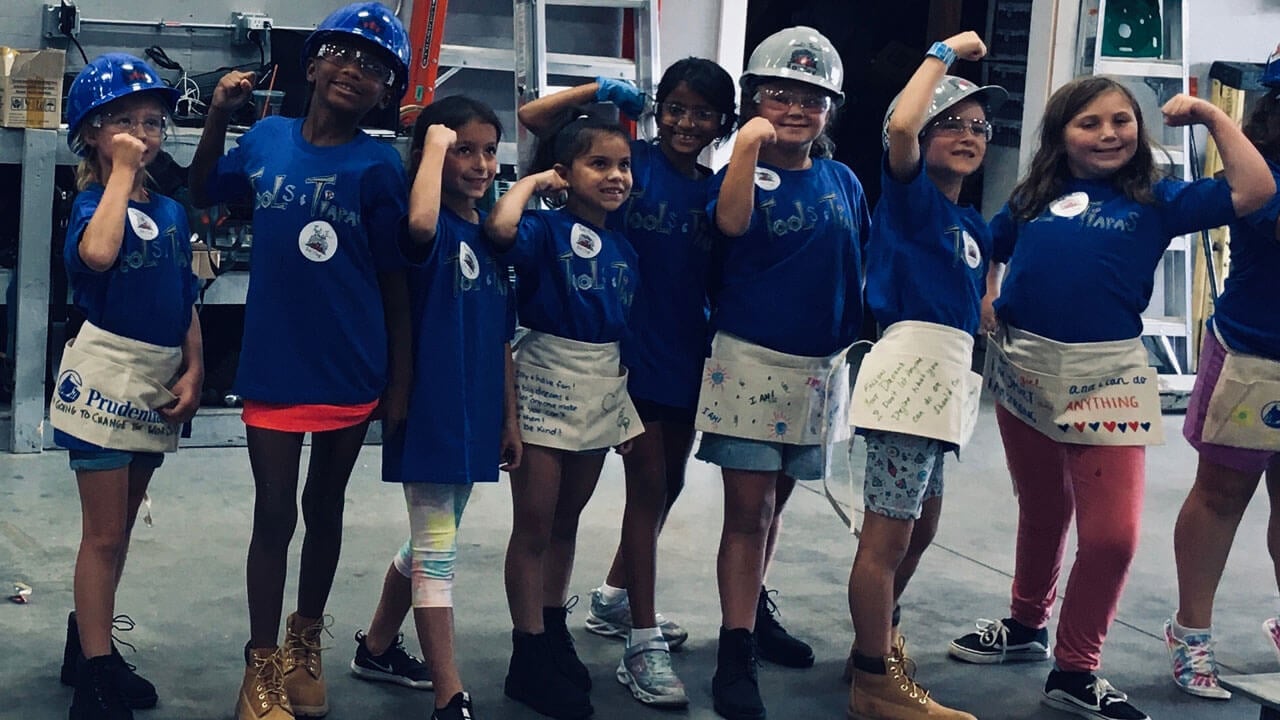
“I hope to build a lasting passion and curiosity with the girls in our community that may inspire them to consider a career as an electrician, carpenter, plumber, auto mechanic, or whatever they dream,” said Joyce-Brady. “My mom has always been a strong leader and a big advocate for women’s rights. During her time as a provost in higher education, she was key in the development of women’s initiatives. That rubbed off on me. We want to show future generations that they can achieve financial independence by going into a STEAM profession (STEM enriched with Arts).”
As the Boston chapter grows, events will incorporate T&T’s full programming arsenal, including electrical, carpentry, ironwork, automotive, sheet metal, coding, solar, architecture, aviation, finance/financial literacy and the arts.
As a student at Quinnipiac, Joyce-Brady was able to hone her leadership skills through her sorority Kappa Alpha Theta, and with support from faculty, including Professor Emerita Sharon Magnarelli, who encouraged her to step out of her comfort zone to pursue a double major in Spanish and public relations.
“I wasn’t the best Spanish student. But Professor Magnarelli continued to encourage me and would stay extra hours to help me succeed,” she said. “Thanks to her support, I was able to pursue my dream to live in Spain and teach English after graduation. Quinnipiac is where I started to develop my leadership skills. Today, I’m hoping to open doors for other young girls in the same way QU did for me.”
Just as they encouraged Joyce-Brady, members of the Quinnipiac community continue to seek out new opportunities to open doors for students while stressing the importance of holding those doors open for those who follow. Throughout any given academic year, events and programs continue to underscore the university’s commitment to provide support for developing female trailblazers while cultivating student mentorship. 
From interactive networking programs to annual awareness events such as the Albert Schweitzer Institute’s International Women’s Day Teach-in, QU programming provides opportunities for students to engage with influential female leaders. The events highlighted only present a small snapshot of the dynamic and vast portfolio of opportunities the university offers its students to help them reach their fullest potential, no matter their gender identity. While the programs may differ, the unified takeaway follows a common thread of support, encouragement and mentorship.
That message was emphasized during February’s “Fireside Chat” between President Olian and Hamden Mayor Garrett. As two prominent leaders on campus and in the local community, Olian and Garrett were invited to speak to students at the PUCWB-sponsored event moderated by School of Business Dean Holly Raider. During her remarks, Olian urged aspiring leaders to seek counsel from others — and not be misled by their own preconceived notions.
“One of the real challenges in leadership — and it doesn’t matter at what level you are leading — is that it’s very easy to start becoming isolated and out of touch,” Olian warned. “All leaders need to overcome the natural barrier of not getting too wrapped up in their own worlds.”

Garrett echoed the need to seek input from others and escape your inner circle to be an effective and present leader. By doing this, she said, students can see themselves in that future through an expanding number of role models.
Olian expanded on Garrett’s point by emphasizing how leadership at the highest levels can provide role models for everyone, not only females in the organization.
“These individuals can become change agents about what happens in the community as well as in leadership structures,” she said. “Diversifying at the top enriches perspectives and opportunities for a community.”
Likewise, Connecticut Lt. Gov. Susan Bysiewicz encouraged women to embrace leadership roles during the “Women in Leadership” panel discussion in March. The event focused on the shared experiences of female public figures, leaders on campus, and those who lead organizations that focus on community building and empowerment.
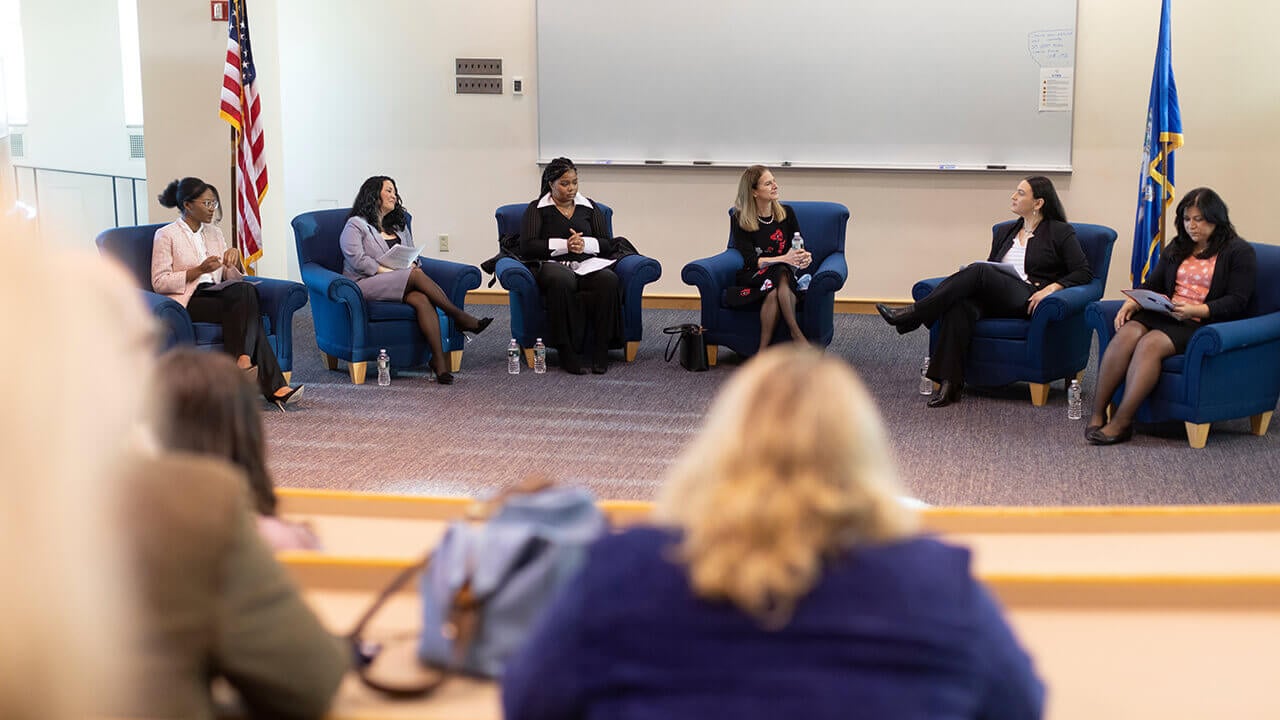
The panel featured Provost Debra Liebowitz, Associate Professor of Legal Studies Sujata Gadkar-Wilcox, Kiku Jones, and recent graduates Ohidiani Imevbore ’22 and Ámbar Pagan ’22, who shared their personal narratives through a thoughtful conversation that spanned generations and cultures.
“Events like these allow us to discuss and share experiences and explore strategies for strengthening women's leadership,” said Gadkar-Wilcox. “While every individual experience is different, there is a common thread among women in leadership positions that often includes persistence in making yourself heard, determination to create a pipeline for other women who are becoming leaders, and the ability to overcome the struggles that come along with gaps in representation and understanding of these unique experiences.”
During her welcome introduction, Liebowitz spoke about how sharing narratives can help shed light on the historical trends and ideas formed about issues of gender that are written into our collective understanding of leadership.
Bysiewicz encouraged the panelists and those in the audience to get more involved in local politics, register to vote and continue supporting each other to bridge the gender gap. She emphasized that women are still underrepresented in leadership roles, including state legislatures, Congress and all levels of government.
“Leaders are people who help others realize their dreams and aspirations,” said Bysiewicz. “Leadership is important in the sense of helping and mentoring individuals but also in examining the ways that we can achieve greater equality and opportunity for everyone. Is it through childcare? Is it through expanded access to healthcare?”
Among her various roles and responsibilities, Bysiewicz serves as chair of the Council on Women and Girls, tasked with providing a coordinated state response to issues that impact the lives of women, girls, their families and the state of Connecticut.
“The topic of ‘women in leadership’ is something I am very passionate about, not just in the corporate world, but also in our Legislature,” said Bysiewicz. “I’ve had the opportunity as the leader of the state Senate to see how it matters when women are involved in legislation like raising the minimum wage or paid family medical leave. These are issues that really affect women and families.”
The ties that unite us Those messages resonated into action when panelists Pagan, Imevbore and Gadkar-Wilcox reunited to advocate for change on the international level through their work with the Oxford Consortium for Human Rights. Most recently, Pagan and Gadkar-Wilcox attended a workshop with an all-female QU team in Oxford, England, focusing on human rights and climate. The workshop enabled students to understand the global context of sustainability and the impact of climate change on global communities, including the vulnerability caused by environmental displacement for climate refugees.
As director of the consortium, Gadkar-Wilcox has been instrumental in organizing workshops for students in Oxford, England, at the United Nations in New York, in northern and southern California, and in Rio de Janeiro, Brazil. In addition, students have participated in campus events such as the leadership panel discussion while also engaging beyond campus boundaries to benefit their local and global communities.
“Participating in the Oxford Consortium for Human Rights has provided Quinnipiac students access to leading scholars and practitioners of human rights and global justice,” said Gadkar-Wilcox. “Alumni still identify their engagement in the OCHR workshops as one of the most transformative experiences of their lives. As participants, they become part of a new community of students, scholars, policymakers, and practitioners from different disciplines, backgrounds, regions, and countries around the world. They often tap into that experience to inform their own work beyond graduation, and to collaborate on human rights projects with other participating students.”
Pagan directly credits experiences like the Oxford Consortium for helping her to cultivate her voice, expand her global conscience, and define her personal leadership parameters.
“When it comes to forming change, it’s important to value inclusivity. I learned at QU that it’s important to understand the intersectional ties that bind us together,” said Pagan. “When we talk about women’s struggles, we need to talk about the diversity of women’s communities, whether Black, Latinx, LGBTQ+, etc. At Quinnipiac, I learned how to become a global citizen within my own college community.”
Growing up, Pagan was surrounded by strong role models in her large extended family, including her grandmother, mother, aunts and uncles. As immigrants from the Dominican Republic, her family came to the U.S. with a dream of a better life and encouraged Pagan to work hard, invest in her education and go after whatever she wanted.
“My family taught me to realize my voice is important,” said Pagan, who earned her political science degree with a law in society minor this May. “I think sometimes people have a limited definition of a leader. But you can make your own definition according to your personal values. I believe those values should combine listening, caring and a combination of the skills only you can provide.”
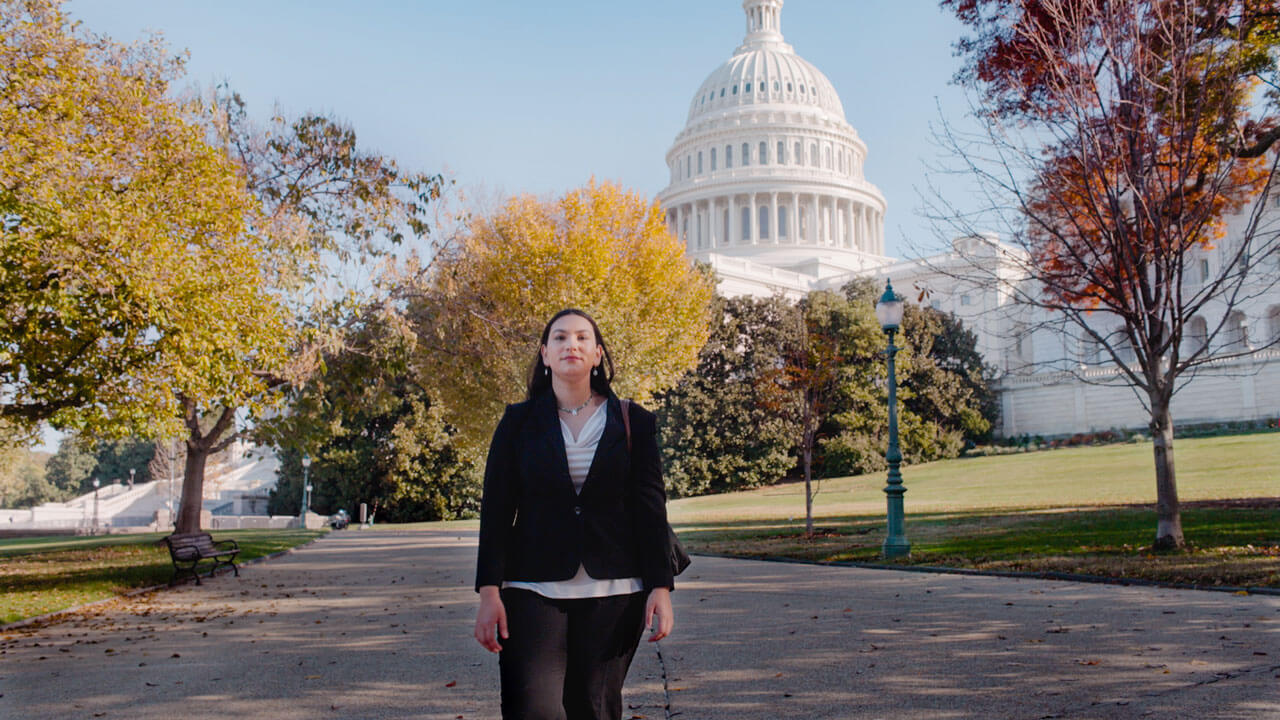
Throughout her QU journey, Pagan worked to amplify the voices of the underrepresented. One of her primary initiatives included working on QU Culture, an organization that strived to educate, entertain and empower underrepresented communities throughout the university.
In addition, Pagan organized outreach events, including Bobcat Culture and Identity Open Mic Night and hosted Quinnipiac’s inaugural Pronouns Awareness Day. She was also a co-founder of the weekly YouTube series “Curl Talk,” a safe space designed to empower women of color.
Solidifying her interest in political science, Pagan represented Quinnipiac at the 2020 Democratic Presidential Debate and, with the encouragement of her professors, she also spent a semester in the nation’s capital through QU in DC, where she was a legislative intern for U.S. Rep. Nydia Velázquez. As she prepares for graduate school at Columbia University this fall, Pagan will utilize her Quinnipiac foundation to pursue a master’s in international affairs with a concentration in human rights and humanitarian policy and a specialization in United Nations studies and international organizations.
“My mentors were the people who really motivated, supported and taught me. Professors like Scott McLean and Marcos Scauso and many others have enhanced my skills to succeed in life and help others,” said Pagan. “When you have college resources focused on cultural learning and diversity awareness as a student, you have the opportunity to become better equipped as a global citizen. I learned there is enough space for all women to have a seat at the table. And we shouldn’t be afraid of being ambitious. That drive allows you to grow your wings, fly and become the person you aspire to be.”
That same sense of global advocacy and female empowerment has also underscored Imevbore’s experience at Quinnipiac. As a political science graduate with an international business minor, Imevbore is currently pursuing her MBA at QU and plans to use her skills to secure a job in the business or policy sector, either as a consultant or political adviser. However, she didn’t have to wait for graduation to utilize her education to make a meaningful impact on her home city of Lagos, Nigeria.
“I am inspired by the prospects of making a positive change in my community or sphere of influence,” said Imevbore. “One of my most recent projects was an infectious disease presentation on slums in Nigeria and the need for adequate medical care. It was a perfect combination of my passion and my major, and I provided recommendations on how things could get better. My project not only brought awareness to a pressing problem, but I was able to raise some money to send back to the children in these slums.”
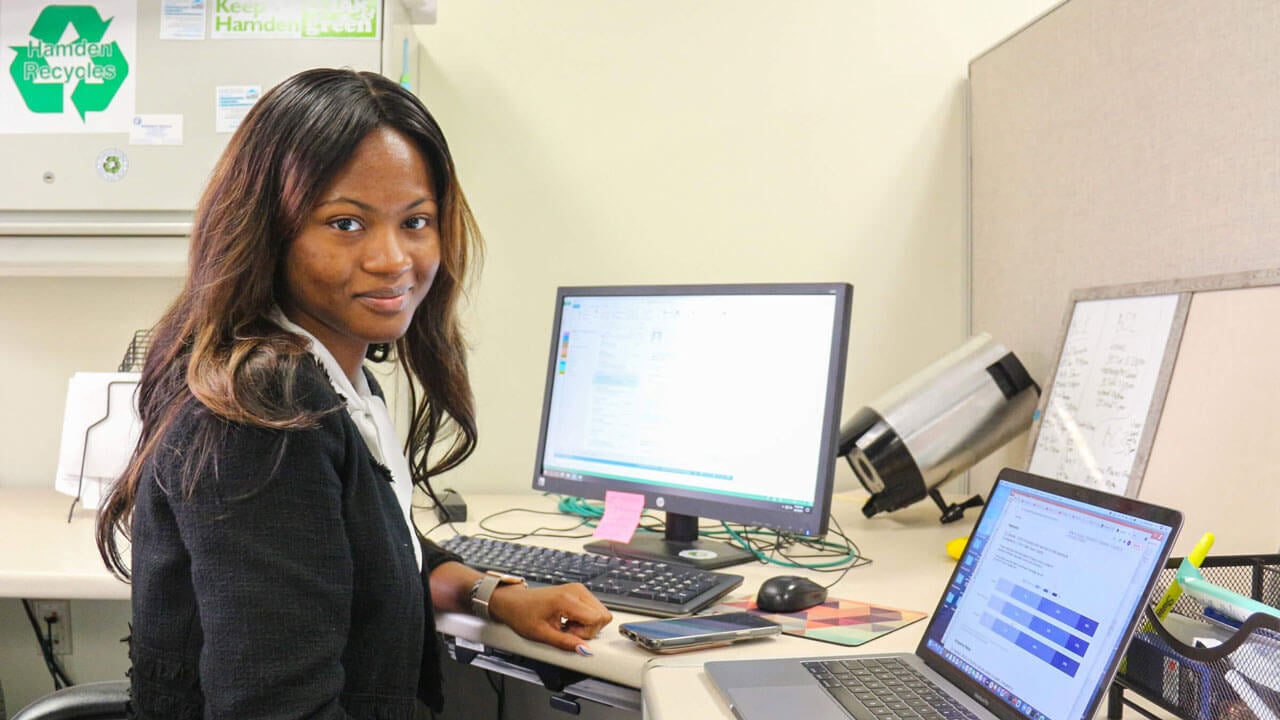
Her inspiration comes from her supportive family, who consciously shielded a young Imevbore from the culturally embedded gender stereotypes that still exist in Nigeria.
“My parents had always raised me to be confident and to go for anything I wanted. Even though I lived in a country with gross gender inequality, I never felt it applied to me as neither my parents nor grandparents made me feel like my gender would stop me from reaching my goals,” said Imevbore. “While the people closest to me did not force any gender stereotypes on me, I was not blind to the misogyny around me. While much has changed in Nigeria since I was 9, the country and its ideas are still developing.”
When she was younger, Imevbore recalls that as an avid swimmer, she didn’t see many female professional athletes to emulate. That is why she says she would name Michael Phelps as one of her role models.
“I am also inspired by women who do the impossible like Serena Williams, Alyson Felix, Ngozi Iweala and Queen Amina of Zaria. They make me proud and inspire me to work hard to be the inspiration for another little girl who wants to chase the same dreams as me,” said Imevbore, as she pauses with a small smile. “I also loved princess Tiana from the ‘Princess and the Frog.’ I loved her courage, her positivity and her strength. She had faith even when things looked bleak.”
In addition to her involvement in the panel discussion with Lt. Gov. Bysiewicz and the Oxford Consortium, she was active on campus with roles such as a Quinnipiac Presidential Public Service Fellow, president of Leading Women of Tomorrow, vice president of Quinnipiac Rotaract Club and a residential assistant. Yet, even with her extensive list of leadership titles, Imevbore says she still struggled with “imposter syndrome” and, at times, wrestled with confidence in her own abilities.
“I started my journey at Quinnipiac doubting myself and finished with the highest award for a political science major, the Outstanding Political Science Student Award. My QU journey was transformative and equipped me for what my future could hold,” said Imevbore. “Quinnipiac came at a time when I had just stopped dreaming big. However, the campus community helped me find myself, realize my goals, and reignited a spark in me to continue dreaming big and work hard to reach my goals.”
Imevbore said that she took advantage of every opportunity that came her way, from a two-week policy immersion program in Washington, D.C., to becoming president of the first female-led policy organization called Leading Women of Tomorrow (LWT). She was also chosen to represent QU at the Yale Policy Competition and as a Rotarian with the Albert Schweitzer Institute.
Imevbore believes an educational environment like Quinnipiac, where people feel supported, heard and seen, is key to building a global community culture where everyone is valued.
“It wasn’t until recently that I realized I have a seat at the table and need to advocate for myself. Now, I think about being a role model and creating a path for other girls or people who look like me and have similar stories and backgrounds,” said Imevbore. “Now, I attack everything with purpose. I have a duty to those who come after me to be the best version of myself so they can see me and think, ‘If she can do it, I can do it, too. And I might do it better.’”
Quinnipiac Today is your source for what's happening throughout #BobcatNation. Sign up for our weekly email newsletter to be among the first to know about news, events and members of our Bobcat family who are making a positive difference in our world.
Sign Up Now